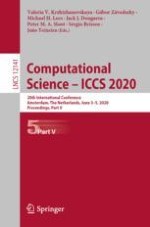2020 | OriginalPaper | Buchkapitel
A Relaxation Algorithm for Optimal Control Problems Governed by Two-Dimensional Conservation Laws
verfasst von : Michael Herty, Loubna Salhi, Mohammed Seaid
Erschienen in: Computational Science – ICCS 2020
Aktivieren Sie unsere intelligente Suche, um passende Fachinhalte oder Patente zu finden.
Wählen Sie Textabschnitte aus um mit Künstlicher Intelligenz passenden Patente zu finden. powered by
Markieren Sie Textabschnitte, um KI-gestützt weitere passende Inhalte zu finden. powered by
